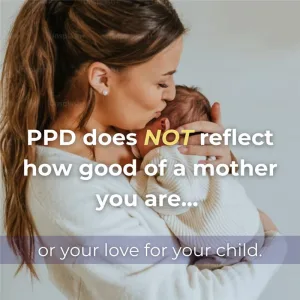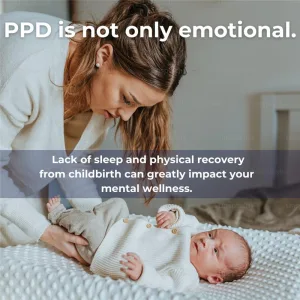Postpartum Depression Signs Every New Mom Should Know
Bringing a new baby into the world is often pictured as one of life’s happiest times, yet for many mothers, it’s also incredibly overwhelming. If you’re feeling a deep sadness or anxiety that goes beyond exhaustion, you’re far from alone. Postpartum depression (PPD) is a common but serious condition that affects about 1 in 7… Read more

Reviewed by The PsychPlus Team
November 6, 2024

Bringing a new baby into the world is often pictured as one of life’s happiest times, yet for many mothers, it’s also incredibly overwhelming. If you’re feeling a deep sadness or anxiety that goes beyond exhaustion, you’re far from alone. Postpartum depression (PPD) is a common but serious condition that affects about 1 in 7 mothers and can feel confusing or even isolating. These feelings aren’t just the temporary “baby blues” many experience; postpartum depression can last much longer and impact every part of your life, making it tough to connect with your baby, loved ones, and even yourself.
Awareness about PPD is essential. By identifying symptoms early, mothers can find the support they need to recover and bond fully with their baby. Resources like those offered at PsychPlus can be helpful, especially if you’re unsure where to start or need professional guidance. Here, we’ll break down the signs and symptoms of postpartum depression, helping you understand when it might be time to seek support.
What is Postpartum Depression?
Postpartum depression (PPD) is a mental health condition that affects many new mothers, marked by persistent feelings of sadness, anxiety, and fatigue that extend beyond the usual exhaustion of early motherhood. While many women experience the “baby blues” shortly after giving birth—mood swings, tearfulness, and mild sadness that usually subside within a couple of weeks—PPD lasts longer and can deeply impact a mother’s ability to care for herself and her baby.
Unlike the temporary baby blues, postpartum depression is a clinical condition that often requires dedicated support and attention to manage effectively. For more on how depression impacts mental health and available support, you can explore our guide on understanding depression and its symptoms.

Facts & Myths About Postpartum Depression
Myth “Postpartum depression happens immediately after birth.”
Fact: Actually, PPD can hit at any time during the first year after childbirth. Some new moms might feel great in those early days, only to notice symptoms creeping in weeks or even months later. It’s important to know that this is completely normal.
Myth “Only women experience postpartum depression.”
Fact: Not true! Dads can feel the effects of postpartum depression too, even if it’s less talked about. The stress, hormonal changes, and lifestyle shifts after a baby arrives can take a toll on both parents’ mental health.
Myth “Feeling depressed means you’re not a good parent.”
Fact: This is a common worry, but remember, postpartum depression is a medical condition and doesn’t reflect your love for your child or your parenting skills. Feeling this way doesn’t mean you’re failing; it just means you need some support.
Myth “If you ignore it, PPD will go away on its own.”
Fact: Unfortunately, ignoring PPD often doesn’t make it disappear. It can linger or even get worse, impacting not just your health but your child’s development too. Seeking help early can be a game-changer in feeling better.
Causes of Postpartum Depression
Hormonal Changes
After giving birth, women experience significant hormonal fluctuations that can impact their mood and emotional well-being. Estrogen and progesterone levels drop sharply, which can lead to feelings of sadness and anxiety. These changes can be overwhelming, especially when combined with the stress of adjusting to a new life as a mother.
Physical and Emotional Adjustments
The transition to motherhood brings not only joy but also a host of physical and emotional adjustments. Sleep deprivation is common as new parents often struggle to get enough rest. This, coupled with the physical recovery from childbirth and the emotional demands of caring for a newborn, can weigh heavily on mental health. It’s important to recognize that these factors can contribute to feelings of anxiety and depression.
Pre-existing Mental Health Conditions
Women with pre-existing mental health conditions, such as anxiety or depression, may find themselves at a higher risk for developing postpartum depression. If you’ve faced mental health challenges before, it’s crucial to stay aware of how you’re feeling after having a baby and to seek support if needed.
Recognizing the Signs of Postpartum Depression
Emotional Symptoms
Watch for signs like persistent sadness, hopelessness, irritability, and frequent mood swings. While mood fluctuations can feel “normal” in early motherhood, especially with the stress of a new baby, persistent feelings of despair warrant attention and care.
Physical Symptoms
Common physical symptoms of PPD include fatigue, changes in sleep patterns—whether that’s insomnia or sleeping excessively—and shifts in appetite. If you notice these changes are affecting your daily life, it’s important to talk to someone about what you’re experiencing.
Behavioral Changes
Behavioral symptoms can manifest as withdrawing from family and friends, lacking motivation for activities you once enjoyed, and feeling a general sense of reduced energy. While some isolation can feel normal as new mothers focus on their babies, prolonged withdrawal is a sign to reach out for help.
It’s crucial to understand that while some of these symptoms might feel typical during the early days of motherhood, they can signal postpartum depression. Awareness is key to ensuring that mothers get the support they need.
How Long Does Postpartum Depression Last?
Postpartum depression doesn’t have a one-size-fits-all timeline; it can begin anytime within the first year after giving birth. For some mothers, it may start shortly after childbirth, while others may notice symptoms appearing months later. Without treatment, PPD can persist for months or even years, impacting not only the mother’s well-being but also family relationships and overall dynamics. Seeking timely support can make a significant difference in recovery and the ability to fully engage in life with a new baby.
Postpartum Depression vs. Baby Blues: Understanding the Difference
The “baby blues” are common in new mothers and usually involve mild sadness, mood swings, and anxiety that peak within the first few days postpartum and subside within two weeks. The baby blues are linked to the hormonal shifts and exhaustion that come with early motherhood.
In contrast, postpartum depression is more intense and longer-lasting, affecting day-to-day life, relationships, and the mother’s connection with her baby. PPD symptoms are persistent, often worsening without intervention. If these feelings linger beyond two weeks, it’s important to seek help and support from a healthcare provider.
Risk Factors of Postpartum Depression
Biological Factors
A family history of depression or sensitivity to hormonal changes can increase a mother’s risk of developing PPD. If a mother or other family members have a history of mental health issues, there’s a higher chance of experiencing PPD.
Psychological Factors
Certain psychological factors, like pre-existing anxiety, a high-stress lifestyle, or feeling overwhelmed by the demands of parenthood, can contribute to PPD. A lack of emotional support or an inability to relax can exacerbate these feelings.
Social Factors
Social and economic challenges, such as financial strain, limited access to childcare, or relationship difficulties, can significantly impact mental health during this period. These factors often make adjusting to life with a newborn more challenging.
Recognizing these risk factors can empower women to seek support proactively, reducing the impact of postpartum depression on their lives and the well-being of their families.

Treatment Options for Postpartum Depression
Therapy and Counseling
Therapy can be incredibly beneficial for managing postpartum depression. Cognitive Behavioral Therapy (CBT) is particularly effective, helping mothers reframe negative thoughts and develop coping strategies. Other therapeutic options, such as interpersonal therapy, provide a safe space to address challenges unique to the postpartum period, like role transitions and relational stress.
Medication Options
For some women, medication may be a necessary part of recovery. Antidepressants, especially SSRIs, are commonly prescribed and can be safe for breastfeeding mothers under a doctor’s supervision. Working with a mental health professional ensures you’re on a suitable treatment plan that aligns with your needs.
Lifestyle Changes
Lifestyle adjustments, although small, can make a meaningful difference. Incorporating self-care practices—like prioritizing rest, engaging in light physical activity, or practicing mindfulness—can help relieve symptoms. Building a strong support network and connecting with other mothers can also provide emotional reinforcement. If you’re looking for professional support, consider PsychPlus, where compassionate providers can guide you through tailored treatment options.
When to Seek Help
While it’s common to experience a mix of emotions after childbirth, some signs suggest that professional help may be needed. Red flags include persistent feelings of sadness, lack of motivation, inability to bond with your baby, or thoughts of self-harm. When these feelings interfere with daily life or don’t improve, reaching out is crucial.
You can start by talking to a primary care doctor or reaching out to a mental health specialist experienced in postpartum care. At PsychPlus, we offer comprehensive support, including therapy and treatment options tailored to postpartum mental health. To get started, you can schedule an appointment with our team of providers who are here to help.
Conclusion
Recognizing postpartum depression is a crucial step in supporting both the mother’s health and her relationship with her baby. Awareness and early intervention can make a significant difference, helping mothers find relief and regain a sense of balance during this transitional time. Remember, seeking help isn’t a sign of weakness—it’s an act of strength for yourself and your family.
If you or a loved one is experiencing symptoms of postpartum depression, don’t hesitate to reach out. At PsychPlus, we’re dedicated to providing compassionate and accessible care, offering same or next-day appointments, insurance acceptance, and convenient options for both tele-visits and in-office support. Our team is here to support you every step of the way, so you never have to face this journey alone.
Find a mental health care provider near you
Learn about the conditions we treat


